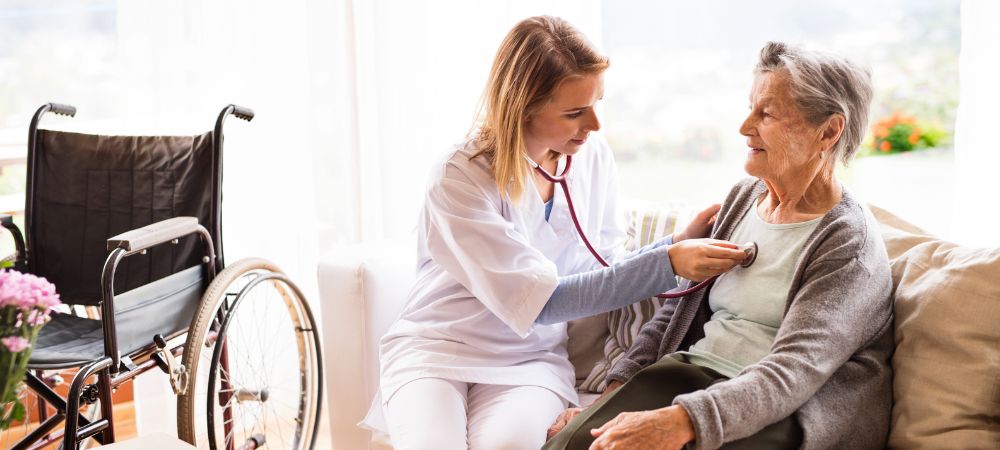Recently updated on January 19th, 2026 at 01:35 pm
 Selecting the proper care for our elderly loved ones is a crucial decision that significantly affects their quality of life. The debate between family caregivers and professional home care centers on understanding the distinct advantages and challenges each presents.
Selecting the proper care for our elderly loved ones is a crucial decision that significantly affects their quality of life. The debate between family caregivers and professional home care centers on understanding the distinct advantages and challenges each presents.
Family caregivers offer a personal touch and deep emotional connections but may face burnout-related challenges and lack formal medical training. Professional home care, on the other hand, provides specialized healthcare services delivered by trained professionals. It ensures regulatory compliance and broad coverage of healthcare needs, albeit at a financial cost.
This guide focuses on different aspects of both options. It aims to equip families with the knowledge needed to navigate the complexities of eldercare and facilitate a choice that promotes the overall well-being and contentment of senior family members.
Understanding Family Caregivers
 At its core, family caregiving embodies the act of providing care to aging or disabled relatives without financial compensation. This role is often embraced out of love, duty, or necessity. It encompasses many responsibilities, from managing daily household tasks and administering medications to offering physical assistance and emotional support.
At its core, family caregiving embodies the act of providing care to aging or disabled relatives without financial compensation. This role is often embraced out of love, duty, or necessity. It encompasses many responsibilities, from managing daily household tasks and administering medications to offering physical assistance and emotional support.
The Emotional Heartbeat of Caregiving
The unique bond between a family caregiver and their elderly loved one is irreplaceable. This relationship, built on years of shared experiences, trust, and affection, often makes family caregiving deeply personalized.
Caregivers intuitively understand their loved one’s preferences, needs, and even unspoken emotional cues, providing care that is as compassionate as it is tailored. This level of personalized attention is difficult to replicate in any professional setting, making family caregivers indispensable in the senior care landscape.
However, this emotional closeness also introduces a unique set of challenges. The responsibility of caring for a loved one can blur the lines between the roles of family member and caregiver, leading to complex emotional dynamics.
Caregivers often experience feelings of guilt, frustration, and sadness alongside the joy and satisfaction of providing care. The emotional labor involved in caregiving is immense, requiring caregivers to manage their own emotional well-being and that of their loved ones.
The Silent Struggle of Unpaid Caregiving
Beyond the emotional aspects, family caregiving carries significant financial, physical, and social implications. The absence of a formal paycheck belies the true cost of caregiving, including lost income, diminished savings, and the hidden expenses associated with medical care, home modifications, and more. Many caregivers sacrifice their careers, leisure time, and even their health, as the demands of caregiving leave little room for personal care.
Physically, the toll of caregiving can manifest in chronic stress, exhaustion, and health problems, compounded by the neglect of the caregiver’s own health needs. Socially, caregivers may experience isolation as their world narrows to focus almost exclusively on their caregiving responsibilities, leading to a loss of social connections and support networks.
The Reality of Caregiver Burnout
At the intersection of these emotional, financial, and physical challenges lies caregiver burnout—a state of total exhaustion affecting mind, body, and spirit. Burnout is the culmination of ongoing, unrelieved stress and the constant demands of caregiving. It can lead to serious health issues, depression, and a reduced ability to provide care, impacting both the caregiver and their loved one.
Recognizing the signs of burnout is crucial for caregivers. Symptoms may include feelings of irritability, anxiety, or detachment; changes in sleep patterns; weight fluctuations; and a loss of interest in activities once enjoyed. Acknowledging these symptoms early and seeking support can prevent more severe consequences.
Today, innovative solutions like automated scheduling systems, real-time health monitoring via wearables, and digital support networks are actively reducing caregiver burnout by easing logistical burdens and providing accessible psychological resources.
Navigating the Caregiving Journey
For caregivers to sustain their invaluable role, they must find balance and support.
This may include utilizing short-term respite stays, adult day programs, and flexible in-home respite services, alongside digital support networks and automated scheduling tools that reduce burnout and provide psychological support.
Prioritizing self-care, setting realistic boundaries, and maintaining connections with friends and family are also vital strategies.
Moreover, effective communication with healthcare professionals and leveraging available financial and medical resources can alleviate some of the burdens.
Technology now plays a pivotal role, with smart home devices, wearable health monitors, AI-powered platforms, and telehealth enhancing care coordination, providing emotional support, and enabling real-time health monitoring and medication reminders.
Understanding and addressing caregiving challenges are crucial in ensuring the well-being of both the caregiver and their loved one. By fostering a community of support, recognizing the signs of burnout, and prioritizing their own health and well-being, caregivers can navigate the complexities of this role with resilience and grace.
Professional Home Care Explained
 Understanding professional home care can be a journey of discovery for families seeking support for their elderly loved ones. Knowing the types of care available, as well as the qualifications and regulations governing professional caregivers, is essential for making an informed decision that best meets the senior’s needs.
Understanding professional home care can be a journey of discovery for families seeking support for their elderly loved ones. Knowing the types of care available, as well as the qualifications and regulations governing professional caregivers, is essential for making an informed decision that best meets the senior’s needs.
Types of Professional Caregivers
Professional home care services bridge the gap between independent living and nursing home care, providing vital support tailored to the individual’s health requirements. These services are split into two primary categories: skilled nursing care and non-medical home care.
- Skilled Nursing Care is delivered by licensed professionals and now integrates advanced remote monitoring, telehealth, and predictive analytics to manage conditions proactively, especially for post-surgery recovery or chronic disease management, ensuring systematic care under high regulatory standards.Skilled nursing care ensures that a senior’s complex health needs are met in the comfort of their own home, under the guidance of a healthcare professional.
- On the other hand, Non-medical Home Care focuses on assisting with daily activities and now often incorporates smart home technology, companion robots, and AI-driven care coordination to enhance safety, independence, and personalized care, supported by state licensing and background checks.
They may also provide companionship and transportation to appointments, enhancing the senior’s quality of life and independence without offering medical services.
Caregiver Qualifications and Regulatory Oversight
When it comes to professional home care, caregiver qualifications, and agency regulatory oversight play critical roles in ensuring high-quality, reliable care.
- Caregiver Qualifications vary based on the type of care provided. Skilled nursing care providers are required to have a nursing license, reflecting their extensive training and competency in medical care. Non-medical caregivers, while not needing medical certification, often undergo training programs and are subject to background checks to ensure their ability to provide safe, effective care.
- Regulatory oversight is another layer of protection for seniors and their families. Professional home care agencies are typically regulated at the state level, subject to inspections, and required to adhere to specific standards of care. This oversight helps maintain professionalism and accountability, giving families peace of mind that their loved ones are in good hands.
These regulations and qualifications are not just bureaucratic hurdles; they are safeguards that ensure every caregiver entering a home has the skills, knowledge, and integrity to provide compassionate, competent care. Families entrusting their loved ones to professional caregivers can take comfort in knowing that these measures are in place to uphold the highest standards of care and safety.
Recent advancements have transformed professional home care, with telehealth and remote monitoring becoming standard for virtual visits and continuous health tracking. AI-driven platforms now enable personalized care routines and dynamic adjustments, while sector-specific innovations—such as predictive analytics in skilled nursing and companion robots in non-medical care—enhance safety and independence. Case studies demonstrate success, like fall prevention programs using wearables to reduce hospitalizations and post-surgery home care improving recovery rates through remote monitoring.
Costs and Financial Considerations
Caregiver Expenses
The financial landscape of caregiving is marked by stark contrasts between family caregiving and professional home care. Family caregivers often shoulder a significant financial burden, though not always in the form of direct payments. Instead, they face lost income opportunities, potential job sacrifices, and various out-of-pocket expenses related to caring for their loved ones. These costs can quickly accumulate, affecting the family’s financial stability.
In contrast, professional home care requires upfront payment for services rendered, translating into clear, direct costs. These expenses vary depending on the care level needed— from personal care assistance to skilled nursing services. Understanding these costs is crucial for families planning for long-term care.
Cost Comparison and Insurance Coverage
Comparing the costs of family caregiving and professional home care involves more than just tallying receipts; it requires considering value, quality of life, and potential financial aid. Professional home care might seem more expensive at first glance, but insurance and various programs can defray some expenses.
Long-term care insurance, Medicare, and Medicaid may cover parts of professional home care services, especially those deemed medically necessary. On the other hand, family caregivers might find financial relief through tax deductions or state programs designed to support caregiver responsibilities. A thorough cost-benefit analysis, including these potential supports, can offer a clearer picture of the financial implications of each care option.
Quality of Care: Professional Vs. Family
Care Standards
Professional home care agencies operate under strict regulatory standards designed to ensure a high level of care. These standards, enforced by state and federal agencies, mandate certain operational, ethical, and quality benchmarks that agencies must meet. This regulatory framework offers families peace of mind, knowing that their loved ones are receiving care that meets nationally recognized standards.
Such consistency in care quality is challenging to achieve in family caregiving setups, where informal care processes are shaped by individual capabilities and resources. The professional oversight also facilitates a systematic approach to managing health conditions, ensuring that care protocols are followed meticulously.
Training and Certification
Professional caregivers bring a wealth of knowledge and expertise to their roles, underpinned by rigorous training and certification requirements. This education ensures that caregivers are well-equipped to address a broad spectrum of care needs, from basic assistance with daily activities to managing complex medical conditions.
Certification processes often involve both theoretical knowledge and practical experience, creating a skilled workforce capable of providing high-quality care. This level of professional development supports the delivery of specialized care services tailored to each senior’s unique needs, something family caregivers, despite their best intentions, may lack the training to offer.
Specialized Care Needs and Healthcare Oversight
For seniors with specialized medical needs, the expertise of professional home care providers is invaluable. Conditions such as Alzheimer’s disease, mobility issues, or chronic illnesses require specific care strategies and interventions that trained professionals are better equipped to provide.
Additionally, professional home care is often delivered under the oversight of healthcare professionals, such as registered nurses or physicians. These professionals can supervise care plans, make adjustments as needed, and ensure the integration of care with the senior’s overall health strategy. This comprehensive approach ensures that seniors receive basic care and holistic support designed to improve their overall health and well-being.
Availability and Flexibility
Scheduling Care and 24/7 Caregiving
Professional home care services offer the flexibility to schedule care as needed, including the possibility of 24/7 caregiving, something that might be challenging for family caregivers to provide.
Emergency Response and Care Plan Adjustments
Professional caregivers are trained to handle emergencies, leveraging wearables and smart home sensors for automated alerts (e.g., fall detection), and use AI for real-time care plan adjustments based on health data, ensuring swift responses and proactive interventions.
Emotional Considerations in Caregiving
 Family Dynamics and Professional Detachment
Family Dynamics and Professional Detachment
The balance between emotional involvement and professional detachment is delicate in caregiving scenarios. With their inherent emotional ties, family caregivers offer a level of care steeped in personal history and deep affection.
However, these same ties can occasionally lead to tension as the roles of caregiver and family member blur. Professional caregivers, in contrast, bring a level of professional detachment that can sometimes be more beneficial for the senior’s emotional and social well-being. This detachment allows them to provide care without the complexities of family dynamics, potentially preventing the kinds of tensions that might arise within families over caregiving decisions or methods.
Caregiver Relationship and Social Isolation Prevention
Professional caregivers also play a pivotal role in preventing social isolation, a common risk for many seniors. By providing companionship and facilitating connections beyond the family circle, they contribute significantly to the senior’s social life.
This involves basic social interaction and encouraging participation in broader community activities, ensuring seniors have regular, meaningful engagements outside their immediate family. This aspect of care is crucial for seniors’ mental and emotional health, offering them a sense of belonging and community that enriches their daily lives.
Making the Right Choice
Assessing Senior Needs
The decision between family caregiving and professional home care should start with a thorough assessment of the senior’s needs, considering their physical, emotional, and social requirements.
Family Decision-making
Engaging in open and honest family discussions is critical in the decision-making process. It allows for the exploration of each option’s pros and cons and ensures that all family members’ views and concerns are considered.
Care Options Evaluation
Evaluating care options involves looking beyond immediate needs to consider long-term implications for the senior’s quality of life and the caregiver’s well-being. This includes reviewing the flexibility of care arrangements, the potential for caregiver burnout, and the quality of care provided.
Caregiver Selection Process
Choosing the right caregiver, whether a family member or a professional, requires careful thought. It’s important to research and vet potential home care agencies or caregivers for professional care, considering their qualifications, experience, and reputation.
For family caregivers, discussions about boundaries, expectations, and support systems are crucial to ensuring that they can sustainably provide care without compromising their own health and well-being.
FAQs:
Conclusion:
Deciding between family caregivers and professional home care is a nuanced and deeply personal choice that impacts everyone involved, especially the senior at the heart of the decision. Both paths offer unique benefits and pose distinct challenges.
Family caregiving is marked by its deeply personal nature and the strong emotional connections it fosters. Yet, it carries the risk of caregiver burnout and may require more professional expertise to address complex medical needs. Conversely, professional home care delivers specialized skills and adaptability and is governed by regulatory standards. It offers a more structured approach to care at a financial cost, albeit potentially less personalized.
The decision ultimately hinges on the specific needs and situation of the senior and their family. It involves striking a careful balance among quality of care, emotional well-being, and financial factors. Engaging in open family discussions about the available options, conducting a thorough assessment of the senior’s needs, and carefully vetting potential caregivers are all crucial steps in making a choice that aligns with the best interests of your loved one, ensuring their health, joy, and dignity are upheld in their golden years.
If you’re navigating this complex decision and seeking the best home care services for seniors, consider Loving Homecare. Our dedicated team offers a range of personalized, professional care solutions designed to meet the diverse needs of seniors, all while providing peace of mind through our commitment to quality, flexibility, and compassionate care. Contact now!


 Family Dynamics and Professional Detachment
Family Dynamics and Professional Detachment